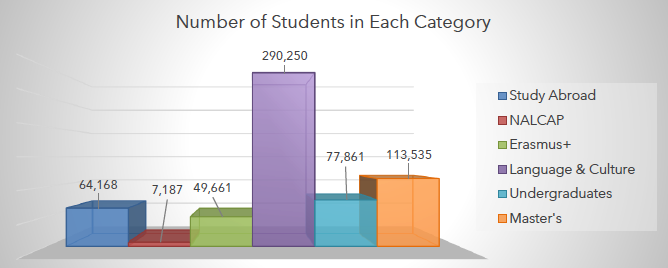The intersection of Study Abroad programs and tourism is quite an obvious one, with foreign students taking advantage of their time in the host country to travel around and enjoy the local culture. So it made sense for Bárbara Garcia of APUNE to attend the annual Fitur (Feria Internacional de Turismo) at the IFEMA in Madrid back in January, where she presented the findings of The Economic Impact of International Students in Spain in the 2022-2023 Academic Year Report.
This recently released report was co-authored by Bárbara herself and Dr Cristina Grasset and is a fascinating insight into the enormous impact that foreign students have on the Spanish economy. The first bit of good news from the report is that student numbers in general have not only bounced back from pre-pandemic levels but actually increased too (although the Study Abroad numbers aren't quite up to 2019 levels).
Meanwhile, looking at various metrics and sources (such as the Erasmus + program, NALCAP and SEPIE), the report reveals that international students' overall economic impact on the Spanish economy amounts to over €6 billion!

This figure includes students of myriad programs and studies - not just the Study Abroad cohort. Those enrolled in Spanish language schools is the most numerous, for example, accounting for 48.16% of the total. The second largest group is that of students completing master’s programs of all types, accounting for 18.84%, followed by undergraduates (12.92%) and study abroad participants (10.65%). Erasmus+ contribute with 8.24% of the overall figure, and NALCAP Auxiliares de Conversación are the smallest, with 1.19%.

Barbara Garcia (far right) at FITUR in January 2025
Barbara also pointed out that, aside from the benefit to the local economy, it's also important to highlight the long-term impact Study Abroad students have, globally. Upon their return home, students tend to promote Spain and its products in their home country. Plus, In the future, some may achieve positions where they can strengthen international and commercial relations. This is obviously a valuable long-term positive outcome for both countries and their citizens.
Barbara also participated in a panel discussion on the current situation of the language tourism sector. David Trigo, Director of the Federation of Spanish Language Schools (FEDELE) moderated this session along with Eva Laguna (President of FEDELE), Cristina Ceballos from the Faculty of Tourism and Finance at the University of Seville, and Bárbara, Collaborating Researcher of Spain Education Programs.
Both presentations were a huge success and generated a lot of buzz on social media networks such as LinkedIn. APUNE's role in promoting and analyzing the impact of Study Abroad programs is as crucial as ever and we're looking forward to seeing how the sector grows in the next few years.
If you'd like a copy of the full report, please contact us.